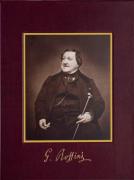Rossini

L'artista, l'uomo, il mito
Rossini's personality deserves attention in many respects. As a composer he swept away all his competitors in his almost 20-year operatic career and then for a long time dominated Italian and European theaters as if he were a "Napoleon of music" (Stendhal, 1824). He was considered such an important and influential musician that he was choosen, along with Beethoven, to represent European music of the early 19th century (Kiesewetter, 1834). This book aims to explore the reasons for his success, his importance in the musical landscape of his time and the components of the culture of the time in his operas. But Rossini's life is also of exemplary interest, as it reflects the historical and political events of his epoch: the upheavals of the Napoleonic era and the year 1848, the time of the Restoration and the Second Empire, through to the social tensions and the rise of the class struggle. Rossini, of course, as an artist, but also as a person with all his strengths and weaknesses, who became a myth even before his death.